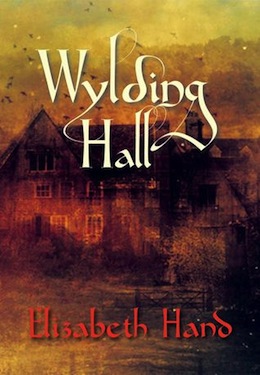When writing a post on Elizabeth Hand’s writing for a series called “That Was Awesome,” there’s a certain temptation to shortcut the entire thing, and simply list her bibliography. Because, really, if you want to read a writer who knows how to do awesome—from the creepy that hides on the edges of the page to the numinous that bursts across it—you should be reading Elizabeth Hand.
Instead of just pointing you in her general direction, though, I’m going to talk specifically about one of her more recent books, Wylding Hall. It is definitely awesome—and recently nominated for both the Locus and Shirley Jackson awards, so you don’t have to take my word for it.
Note: This essay contains what might be structural spoilers for Wylding Hall. I’ve tried to be as vague as possible, but if you have any doubts, go read that first. You know what? Do that anyway. It’s really good.
Wylding Hall is an oral history of a folk band that never was. It is also the history of a haunting. The band itself, Windhollow Faire, is haunted by a tragedy in its recent past as events open. A young woman, who sang in the band, is dead. The band is unsettled, and their manager books them into a remote and strange old house—Wylding Hall—for the summer. To write songs, to regroup. The place is golden, maybe even a little magic.
The manager’s plan might have almost worked, but Wylding Hall is maybe also haunted by something or someone, too.
It’s that something or someone that I want to talk about, the way Hand writes this haunting, because never in my life have I read a book in such a state of suspended tension—with the hair on the back of my neck raised and gooseflesh over my arms—as this one.
It’s a book that begins with what might be a poem (technically is, from Thomas Campion, written in the early 17th century), but might also be a spell, or a summoning:
“Thrice tosse these Oaken ashes in the ayre;
Thrice sit though mute in this inchained chayre;
And thrice three times tye up this true loves knot,
And murmur soft shee will, or shee will not.”
It is possible that this summoning works, that once these words are spoken, someone is coming. It is certain that something weird happens at Wylding Hall that summer.
It’s the oral history format that makes this slow and gradual introduction of the haunted element possible in this book because it’s a format that means we never get the story straight on. Various characters—who all note that they were all drunk and high during the summer that Windhollow Faire spent at Wylding Hall, and so perhaps might not have the most accurate memory of things—insist that they are the one whose account should be read as true, but none of them have the whole story. There’s room for weirdness to slip in around the edges, and it does, quietly creeping in, until it become impossible to ignore.
Except that the weird things that are happening are also, almost always, explainable. There are mundane reasons for nearly all of them—maybe there were some birds? Maybe in the house? And who hasn’t gotten lost or seen something weird in a strange old house?—and people are telling the story of something that happened a long time ago, when they were very young, and they were all high and drunk and and and…
There is always the possibility that the strangeness in the book, in Wylding Hall itself, is just that: strange. Not supernatural. And there’s the sense that the characters almost want the explanation to be mundane—for what happens later that summer to be simply a tragedy, and not something that might somehow be worse.
It’s a book that begins with a summoning but the proof that the summoning works doesn’t occur until two-thirds of the way through the book. We know it’s coming—well, we know something is coming—because the story is being told. Something (someone?) happened to these people, but the reveal is left late, stretched out. Like I said, this is a haunted story.
And even then! Even when the strange young woman shows up in the bar that night, precipitating the eventual disappearance of the band’s lead singer, all the weirdness can still be explained away.
Until the moment that it can’t. Absolutely, utterly, can’t.
But even that moment, the moment that shows the reader, and the remaining members of the band that at least one of the things that happened that summer at Wylding Hall was not at all something that was part of the normal world—happens late. Happens after the disappearance has occurred, happens after the band has left Wylding Hall.
And perhaps that’s why it works—that the weird becomes inescapable when seen in a sterile office, rather than in the otherworldly walls of Wylding Hall. That the weight of the almost-possible that has built and built and built throughout the course of the story needs only a feather to tip it into the firmly unpossible, and reframe an entire novella’s worth of events.
It’s brilliantly done, and it is, completely, awesome.
 Kat Howard lives in New Hampshire. Her short fiction has been nominated for the World Fantasy Award, anthologized in year’s best and best of collections, and performed on NPR. Roses and Rot is her debut novel. You can find her on twitter at @KatWithSword.
Kat Howard lives in New Hampshire. Her short fiction has been nominated for the World Fantasy Award, anthologized in year’s best and best of collections, and performed on NPR. Roses and Rot is her debut novel. You can find her on twitter at @KatWithSword.










